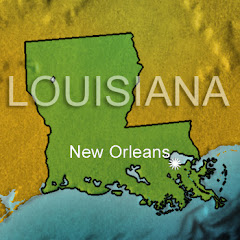Will Governor Jindal's Agenda stomp out corruption in Louisiana?
Besides disclosure, Jindal's agenda spreads across five other topics: conflicts of interest, transparency for lobbyists, ethics education and enforcement, public access to information, combating fraud and abuse and improving the campaign finance laws.
The governor called special attention to the fact that Louisiana lags in many comparisons of state ethics laws. "When we adopt these bills, Louisiana will move from the bottom to, at the very least, the top five of those rankings," he said. "The nation is watching Louisiana."
Jindal said the agenda includes all 31 points in his campaign platform on ethics, plus ideas from his transition team, government watchdog groups and civic and business organizations pushing an ethics overhaul.
Let's hope so because Louisiana needs an overhaul.
Saturday, February 2, 2008
Jindal's Agenda
Posted by
Boop
at
3:09 AM
0
comments
![]()
Labels: Bobby Jindal, ethics reform
Friday, February 1, 2008
Politicians May Have To Reveal Income Under Proposed Bill
The panel proposed that lawmakers, statewide elected and appointed officials and locally elected officials -- perhaps with an exemption for those serving jurisdictions with fewer than 5,000 people -- be required to disclose the same information that the governor and candidates for that office must make public under existing law.
That document details employment, property holdings, investments, debts and business associations and directorships of a filer and spouse. The information is reported in six financial ranges.
Current law requires legislators to disclose only income they receive from government entities and from gambling interests regulated by the state. There is no disclosure required of the six statewide officeholders other than the governor, from statewide appointed officials or from any local authorities. Jindal has signed an executive order extending the disclosure requirements to his Cabinet, though that group will not have to file its first forms until Jan. 15, 2009.
Posted by
Boop
at
2:47 AM
0
comments
![]()
Labels: disclosure, louisiana
Thursday, January 31, 2008
Law Shields Corp From Hurricane Katrina Damages
Although the Army Corps of Engineers knew that the levee was faulty, they will not be held responsible legally for the physical, emotional and property damages resulting from the levee failures.
A federal judge ruled Wednesday that the Army Corps of Engineers is immune under federal law from responsibility for damages resulting from the failure of drainage canal walls in New Orleans during Hurricane Katrina.
The action apparently shields the agency from a portion of nearly 500,000 claims filed by New Orleans area homeowners, businesses and city agencies, many of whom navigated traffic jams around the corps' Uptown headquarters or waited in long lines to beat a deadline for filing the claims, totaling more than $3 quadrillion.
They may not have been held legally responsible, but they are definitely morally responsible. I guess since they are a federal agency, moral responsibility will not concern them.
Posted by
Boop
at
1:49 AM
0
comments
![]()
Labels: Army Corps Of Engineers, responsibility
Wednesday, January 30, 2008
Edwards To Visit New Orleans
John Edwards returns to New Orleans today where he will deliver what the campaign bills as a "major address on poverty."
The return to the city where Edwards launched his campaign in late December 2006 is an attempt to inject his voice back into the national scene following disappointing third place finishes in New Hampshire, Nevada, and South Carolina.
While Louisiana is not a Super Tuesday state, Edwards said that today's speech will prove his devotion to New Orleans' recovery following Hurricane Katrina and to the issue of poverty at large.
Following the speech, Edwards will volunteer with Habitat for Humanity to construct homes at the Musicians' Village, an area of the city most devastated by the hurricane in 2005.
Posted by
Boop
at
2:42 AM
0
comments
![]()
Labels: John Edwards, new orleans
Tuesday, January 29, 2008
Health Risks Of FEMA Trailers Ignored
You've heard the TV reports, you've read the new stories: Hurricane Katrina victims were complaining that they were getting sick from the smells emitting from the FEMA trailers. Their complaints were ignored and the Bush Administration knew all about it:
A congressional committee accused the Bush administration Monday of manipulating a study of formaldehyde in FEMA trailers to downplay health risks for the hurricane victims who reside in them.
The House Committee on Science and Technology said that FEMA and the Department of Health and Human Services skirted normal review processes to avoid warnings from a federal scientist who raised red flags about the chemical causing cancer.
Hurricane victims were ignored after the hurricane ravaged the gulf coast so this piece of information would not come as a shock to anyone. After all, we are talking about the Bush administration.
Posted by
Boop
at
1:46 AM
0
comments
![]()
Labels: FEMA, George Bush, Hurricane Katrina
Monday, January 28, 2008
Marc Morial's Questionable Homestead Exemption
Former New Orleans Mayor, Marc Morial, does not live in New Orleans. That is what makes the following a questionable activity by the former mayor:
Though he has been hard to find in the Crescent City, Morial continued to file for, and receive, a local homestead exemption every year. In doing so, he certified that the Bienville Street home was his primary residence -- even though in 2005, he and his wife, television reporter Michelle Miller, bought a $1.1 million home in Maplewood, N.J. New Jersey has no homestead exemption law.
Is this illegal? What if others tried to pull the same stunt. This is a perfect example of the "content of his character". Stay tune...there may be more to come.
Posted by
Boop
at
1:01 AM
0
comments
![]()
Labels: marc morial
Sunday, January 27, 2008
Working Class May Be Forced Out Of 'The Big Easy'
Thousands of blue-collar workers who never lived in publicly subsidized housing increasingly have no place to live in New Orleans. The planned demolition of 4,500 publicly subsidized apartments is less significant to the future, policy experts say, than Katrina's destruction of nearly 41,000 inexpensive rentals that once housed the city's self-sufficient working class.
With no concrete plan to replace those apartments, some say the city's economic base erodes with every blue-collar worker pushed out by higher living costs. Many local officials bank on rebuilding the city's health and biotech sectors, which were emerging before Katrina flooded 80 percent of New Orleans.
Robert Tannen, a New Orleans urban planner, fears the housing crisis for blue-collar workers is undermining eclectic qualities that attract the upwardly mobile.
Posted by
Boop
at
1:48 AM
0
comments
![]()
Labels: crime new orleans, Economy, housing

















